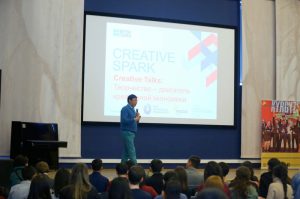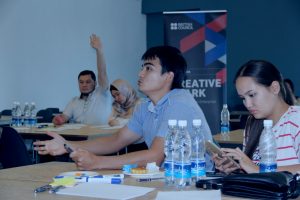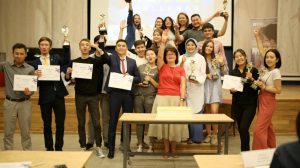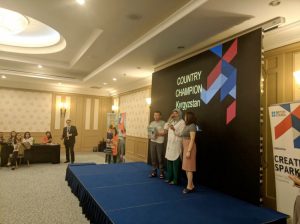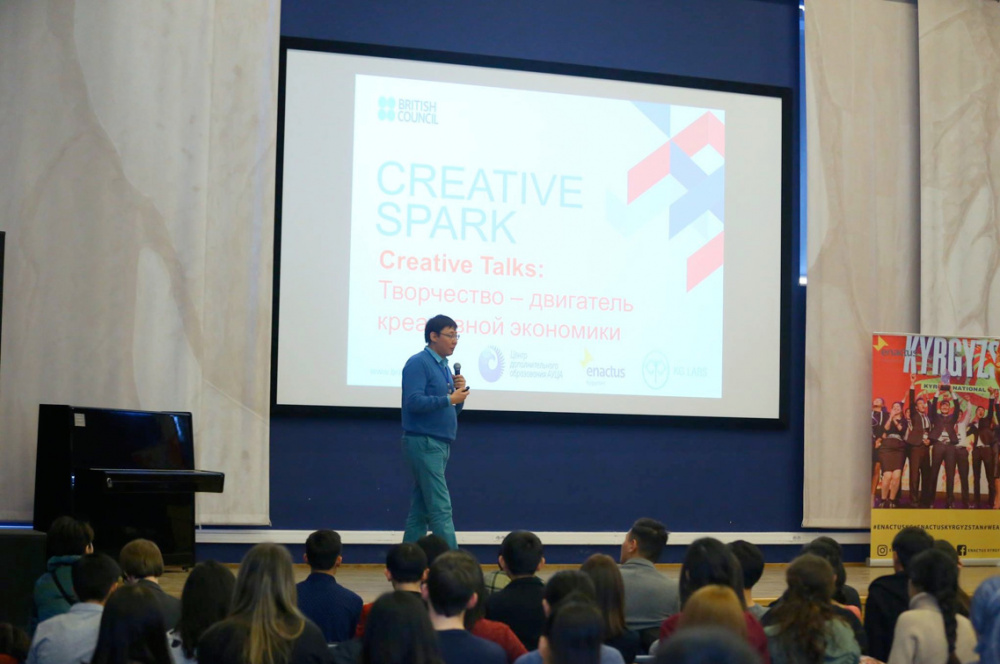
British experience of creative business “drives” entrepreneurial projects of youth of the Kyrgyz Republic
2019-07-24
First, a little introduction and background…
Today, one of the important and growing components of the global economy is the creative economy. The term “creative economy” was coined in 2000 by John Hawkins, an architect and Professor at the Shanghai school of creativity, and a member of the UN creative economy Advisory Board.
According to the latter, the creative economy is a type of economy where inventiveness and imagination are paramount and, accordingly, the active use of creative and intellectual resources for the development of the creative sector of the economy.
The creative industries of the economy include: music, architecture, painting, design, theater, cinema, television, marketing, advertising, IT-sphere, and this list is updated from year to year. Currently, the creative economy has become one of the most important areas of innovative development.
When people lose jobs and old business models stop working, creativity opens up new opportunities and becomes a competitive advantage in the global market. Today, creativity is necessary in any business and can be a driver that contributes not only to business development, but also to the creation of new jobs.
The United Kingdom is one of the most advanced countries in the field of creative economy due to the availability of highly qualified specialists, rich cultural heritage, high interest in new areas of economic activity, stable support of the state, as well as the recognition of the priority direction of education training in entrepreneurial skills at all levels: from school to University.
It is the great experience of the United Kingdom in the field of entrepreneurial education that is a fundamental component in the program of the British creative Spark Council for higher education institutions for the development of entrepreneurship.
Creative Spark is a five-year initiative to support international universities and establish international partnerships to develop entrepreneurial skills and the creative economy in seven countries, including Central Asia (Kazakhstan, Uzbekistan, Kyrgyzstan), the South Caucasus (Azerbaijan, Armenia, Georgia) and Ukraine with the support of the United Kingdom, coordinated and funded by the British Council.
And now to the point
As a result of this initiative, three projects and three partnerships were favoured in Kyrgyzstan. Our history will be about one of such projects.
The center for additional education of the American University in Central Asia together with Enactus Kyrgyzstan and the public Fund KG Labs became the beneficiaries of the Creative Spark project. Our partners from the British side were Cass Business School, City University of London and Change School. It is important to note that Cass Business School occupies one of the leading places in the international ranking of higher education institutions in the field of creative entrepreneurship.
The ultimate goal of our project was to teach creative entrepreneurship skills to more than 500 University students and young entrepreneurs and to obtain concrete results in the form of creative entrepreneurial ideas that can compete in the international competition The Big Idea Challenge, which was one of the conditions of the project.
The journey of creative entrepreneurship in the Creative Spark project included a large number of initiatives, activities and projects.
So, everything in order
First, a number of initiative events “Creative Talks: Creativity – the engine of the creative economy”took place. The purpose of Creative Talks was to familiarize students and young entrepreneurs with the prospects for the development of the creative economy, as well as with the possibilities of free training in creative entrepreneurship, English and participation in the international competition for creative entrepreneurship under the Creative Spark program funded by the British Council. This series of dialogues with young people Creative Talks was held in ten universities of Bishkek in an open free mode for everyone aged 18 to 35 years. The success of these events is confirmed by statistics (coverage of more than 700 people) and positive feedback from participants.
The next key point of this year’s trip was a week-long training for trainers in creative entrepreneurship, which were teachers, business advisors of Enactus teams from 10 universities of Bishkek. Experts on creative entrepreneurship from the UK Sarah Jones (Cass Business School City, University of London) and Neil Marshall (ChangeSchool) taught the basics of design thinking (design thinking is a way of solving problems focused primarily on the interests of the user) and the use of the business model “Canvas” (a tool for visualizing business ideas), necessary to generate creative ideas and test them to create their own business.
The methodology of the training was based on the principle “I do and I understand”. The training did not give ready-made answers, they were created in the process of working on a specific problem identified by each of the groups. Coaches alternately acted as facilitators, moderators, experts, and participants in the non-stop mode moved from one phase to another, testing different methods of working with the idea and problem, switching from intuitive thinking to analytical, and Vice versa. Teamwork, passion for the process and deep reflection are just small pieces of a big picture of a kaleidoscope of creative entrepreneurship.
The next stage was a series of successful trainings on the territory of universities for more than 500 beneficiaries, which were students of the Enactus team, other students who became beneficiaries of the project, as well as young entrepreneurs, participants of our project. The great joint work of trainers and beneficiaries, discussions, debates, reflections, analysis and, of course, the sea of emotions accompanying this process have led to inspiring and concrete results: the participating teams have generated innovative projects in the field of social, business and creative entrepreneurship using the tools and skills acquired during the trainings.
The story was just beginning. Pre-pitch=competitions, discussion and selection of the best ideas and winning teams were held in each of the universities.
On June 4, 2019 at the American University in Central Asia, the awarding ceremony of ten teams – finalists of the Creative Spark project among our partnership in Kyrgyzstan was held. The event gathered more than a hundred beneficiaries of the project for the solemn completion of the first stage of the project and honoring the finalist teams, each of which was awarded with commemorative cups and certificates. Teams from the stage demonstrated a one-minute pitch of their idea, and the audience supported them with a storm of applause. The participants shared their impressions about the ideas of the finalists. This inspiring event ended with a sweet treat in the form of a huge cake with the symbolic name The Big Idea Challenge.
Behind the taste of victory on the lips of a huge cake and chocolate aftertaste, and ahead of the challenge again – national competitions. Again overcoming and the taste of victory is now only for three teams of the project out of ten: Safe Watch (tracker with satellite signal and SOS button), Smartech (production and service of vending machines in Kyrgyzstan) and Oinobook (felt book that develops and introduces children to the Kyrgyz national traditions).
The next challenge in our journey is international competitions in Tashkent.
The explosion of emotions, pride and joy for the representative of our partnership Aizadu Tynybekov with the Oinobook project, which wins not only in the nomination “the Most creative project” among the three best ideas from Kyrgyzstan, but also becomes the champion of the country in the competition The Big Idea Challenge. In addition, the project Smartech in the person of Abdul-Hakim Bakieva is the best country project among the three technological ideas.
Now Aizada with his team will travel to London where they will compete for the title of best project Creative Spark among the seven country Champions. No matter how this story ends, victory or defeat in Britain, but we have already won – 10 teams have created projects, continue to work on them and implement them…
And the main winning result of the Creative Spark project is the development of the potential of our Kyrgyz youth, the development of skills in creative entrepreneurship, their creative potential and desire to create for the benefit of our country, making their contribution to the development of the country’s economy.
P. S.
It is too early to put an end to this story, as the project was supported by the British Council for the new academic year, and our young people again have the opportunity to learn, create and become a business driver in Kyrgyzstan.
Author of the text: Natalia Slastnikova, Executive Director of the AUCA Center for additional education
